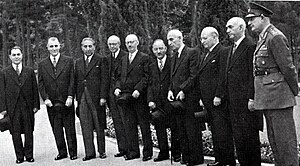First Cabinet of Mohammad Mosaddegh | |
|---|---|
Cabinet of Iran | |
 Mosaddegh and his first cabinet members | |
| Date formed | 28 April 1951 |
| Date dissolved | 16 July 1952 |
| People and organisations | |
| Head of state | Mohammad Reza Pahlavi |
| Head of government | Mohammad Mosaddegh |
| Deputy head of government | Bagher Kazemi |
| No. of ministers | 12 |
| Ministers removed | 10 |
| Total no. of members | 22 |
| Status in legislature | 16th term:[1][2] 8-seats minority influence 8 / 136 (6%) |
| History | |
| Election | 1950 legislative election |
| Legislature terms | 16th (1950–52) 17th (1952) |
| Predecessor | Government of Hossein Ala' |
| Successor | Qavam (V) |
Second Cabinet of Mohammad Mosaddegh | |
|---|---|
Cabinet of Iran | |
 Mosaddegh and his second cabinet members | |
| Date formed | 21 July 1952 |
| Date dissolved | 19 August 1953 |
| People and organisations | |
| Head of state | Mohammad Reza Pahlavi |
| Head of government | Mohammad Mosaddegh |
| Deputy head of government | Gholam Hossein Sadighi |
| No. of ministers | 12 |
| Ministers removed | 2 |
| Total no. of members | 14 |
| Member parties | National Front[4] |
| Status in legislature | 30-seats minority resorted to rule by decree[3] 30 / 136 (22%) |
| Opposition party | Monarchists |
| History | |
| Elections | 1952 legislative election 1953 referendum |
| Legislature term | 17th |
| Outgoing formation | Coup of 1953 |
| Predecessor | Qavam (V) |
| Successor | Zahedi |
The premiership of Mohammad Mosaddegh began when his first government was formed on 28 April 1951 and ended on 19 August 1953, when his second government was overthrown by the American–British backed coup d'état. During the time, the two cabinets of Mosaddegh took control except for a brief period between 16 and 21 July 1952, in which Ahmad Qavam was the Prime Minister, taking office due to resignation of Mosaddegh from premiership and deposed by Shah after five days of mass demonstrations.[5]
- ^ Penner Angrist, Michele (2011), Party Building in the Modern Middle East, Publications on the Near East, University of Washington Press, p. 131, ISBN 0295801123
- ^ Limbert, John W. (2009), Negotiating with Iran: Wrestling the Ghosts of History, Cross-Cultural Negotiation Bks, US Institute of Peace Press, p. 65, ISBN 1601270437
- ^ Nohlen, Dieter; Grotz, Florian; Hartmann, Christof (2001), Elections in Asia: A data handbook, vol. I, US Institute of Peace Press, p. 73, ISBN 0-19-924958-X
- ^ Abrahamian, Ervand (2013), The Coup: 1953, the CIA, and the Roots of Modern U.S.-Iranian Relations, The New Press, pp. 143–147, ISBN 1595588264
- ^ Rahnema, Ali (2014), Behind the 1953 Coup in Iran: Thugs, Turncoats, Soldiers, and Spooks, Cambridge University Press, p. xv–xxii, ISBN 1107076064